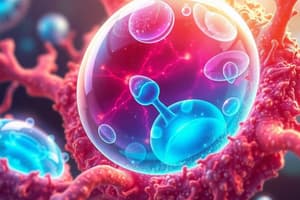Podcast
Questions and Answers
The smallest unit of matter that retains all the chemical properties of an element is called an ______.
The smallest unit of matter that retains all the chemical properties of an element is called an ______.
atom
Organisms that lack a membrane-bound nucleus are known as ______.
Organisms that lack a membrane-bound nucleus are known as ______.
prokaryotes
Groups of similar cells that perform specific functions are called ______.
Groups of similar cells that perform specific functions are called ______.
tissues
The ability to pass on genetic material from parent to offspring is known as ______.
The ability to pass on genetic material from parent to offspring is known as ______.
The process by which organisms respond to diverse stimuli within their environment is called ______.
The process by which organisms respond to diverse stimuli within their environment is called ______.
The change in frequency of traits in populations and species over time is referred to as ______.
The change in frequency of traits in populations and species over time is referred to as ______.
A collection of ecosystems is known as the ______.
A collection of ecosystems is known as the ______.
Large molecules formed by polymerization are called ______.
Large molecules formed by polymerization are called ______.
The process of maintaining a stable internal environment is known as ______.
The process of maintaining a stable internal environment is known as ______.
The smallest fundamental unit of structure and function in living organisms is a ______.
The smallest fundamental unit of structure and function in living organisms is a ______.
Flashcards are hidden until you start studying
Study Notes
Fundamental Concepts of Biology
- Atom: Basic unit of matter; retains all chemical properties of an element.
- Molecule: Formed by two or more atoms joined together.
- Macromolecules: Large molecules created through polymerization, e.g., DNA.
- Organelles: Tiny structures that perform specific functions within cells.
- Cell: Smallest unit of structure and function in living organisms.
- Prokaryotes: Single-celled organisms lacking a membrane-bound nucleus.
- Eukaryotes: Organisms with membrane-bound organelles and nucleus; can be single or multi-celled.
- Tissue: Groups of similar cells working together for specific functions.
- Organs: Combinations of tissues that collectively perform specific tasks.
- Organ System: Groups of organs working in concert.
- Population: Individuals of the same species inhabiting a specific area.
- Community: The aggregate of various populations in a certain area.
- Ecosystem: Comprises all living organisms and their physical environment.
- Biosphere: The global sum of all ecosystems.
Key Characteristics of Life
- Reproduction: Essential for life; ability to produce offspring.
- Heredity: Transmission of genetic material from parent to offspring.
- Cellular Organization: Organized structures comprising one or more cells.
- Growth and Development: Progression toward physical and mental maturity, guided by genetic information.
- Adaptation through Evolution: Continuous evolution in response to environmental changes.
- Response to Stimuli: Organisms react to environmental factors (e.g., plant movement).
- Homeostasis: Maintenance of stable internal conditions.
- Metabolism: Chemical processes that occur within organisms to maintain life.
Detailed Aspects of Life
- Reproduction Mechanism: Single-celled organisms duplicate DNA and divide, leading to new cell formation.
- Genetic Information: Genes provide instructions for inheritance of traits; differentiate between phenotypic (appearance) and genotypic (genetic code) traits.
- Cellular Complexity: Range from simple, single-celled organisms to complex multicellular structures.
- Behavioral Response: Organisms exhibit movements largely aimed at survival, such as finding food or avoiding threats.
- Natural Selection: Mechanism by which individuals more suited to their environment have greater reproductive success, influencing population traits over generations.
- Evolutionary Change: Dynamics involving frequency shifts of traits within populations and species over time.
Studying That Suits You
Use AI to generate personalized quizzes and flashcards to suit your learning preferences.




